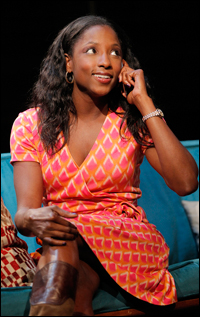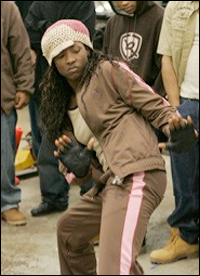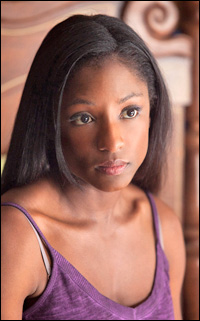
*
Her character, Tara Thornton, may have been shot in the head during the season finale of HBO's "True Blood," but Rutina Wesley can be found in one piece in MCC Theater's world-premiere of Jeff Talbott's The Submission, which runs through Oct. 22 at Off-Broadway's Lucille Lortel Theatre. Directed by Walter Bobbie and also featuring Jonathan Groff, Will Rogers and Eddie Kaye Thomas, the dramatic comedy centers on a young playwright who has written a surefire success about a black family in the projects. Wesley, 32, portrays Emilie Martin, a black actress whom the playwright, a white gay man, casts as his stand-in when his play is accepted into a prestigious festival. Returning to the stage after more than a four-year absence, Wesley speaks to Playbill.com about the importance of bringing up racial issues and breaking down racial barriers in the theatre.
The last time you appeared on stage was in Winter Miller's In Darfur at the Public Theater in 2007. Why such a long absence?
Rutina Wesley: I haven't really been available, or I would just miss out on plays because of date issues. The Submission is really, really, really exciting, and it fits into the "True Blood" hiatus perfectly. I've been itching to get back on stage, and I'm especially excited to be doing a brand new play.
You were classically trained at the University of Evansville and the Juilliard School, but after being in that television mindset for so long, was there a period of adjustment in getting back onstage for The Submission?
RW: Yes and no. The first day of rehearsals it was like, "Oh right, this is how you stay focused and this is how you project your voice properly." I had to reach back to my training at Juilliard and Evansville to pull out all of the tools in my bag. There was a brief minute where I wondered whether I still had it. I still had a lot of stage fright, but so far, so good. We're getting a great response. Theatre is my foundation and the reason I do what I do. It's been nice to rekindle the flame inside of me and get inspired again. This is an important piece and I'm honored to be a part of it.
 |
||
| Wesley in The Submission. |
||
| photo by Joan Marcus |
RW: I always planned to do theatre, film, and TV, but theatre is where it's at! It's so different from TV and film, where you have multiple takes; with live theatre you get one chance and it's different every night. There's nothing like having a live audience in front of you, living and breathing the play with you. And there's nothing like doing a play in New York. I've lived here for ten years, so I feel like I can say that I'm a New Yorker now. What drew you to the role of Emilie Martin in The Submission?
RW: Emilie is amazing. She's amazingly strong, intelligent, witty and wise. She's a great listener; she's able to listen to what you're saying and repeat back what you said but in a totally different way. She's also very grounded, but she's also vulnerable. It's what drew me to the role, and I love playing a woman like her.
Playing Emilie has also allowed you the opportunity to work with director Walter Bobbie of Chicago and Venus in Fur fame.
RW: From day one, our very first conversation, I felt safe. He's so open and so wise. He has approached the play in such an intelligent way so that we all can collaborate and come together in a safe room. The play goes to deep, dark places, and you need that safe space without judgment or criticism. He's like a father to us all. It's great to be in a room with someone who's been around and done such amazing things. He's wonderful and I'm honored to be working with him.
The play is full of intense verbal arguments and incendiary language, and your character is called some of the worst words that a person can be called, seven shows a week. Does that take an emotional toll on you?
RW: We all have to say some pretty nasty things to each other on stage, and it's been challenging because we all love one another so much, and the four of us have become a family. But Walter created a space where we can feel safe in saying these things. It's sometimes difficult to play the drama and intensity and then just brush them off and go home and let it go, but that intensity is part of what I love about theatre. This play goes places that can be uncomfortable, and it brings up topics that people don't want to talk about, but the fact that audiences are leaving and having discussions about it — I think that makes for really great theatre.
Race, racial perceptions and racial stereotypes are obviously major themes in The Submission, specifically with regard to how racial issues may manifest in the theatre world in terms of affirmative-action and colorblind casting. How has race informed your career?
RW: Race has definitely been a big thing for my career, especially being as dark-skinned as I am. It's sometimes hard to be seen as the "leading lady," so to speak. But I do think things are changing — slowly, but they are changing. I hope that with my work on "True Blood" and in this play that I'm able to pave the way for other actors like me to play strong, outside-the-box characters. Jeff Talbott, our playwright, hasn't written a stereotype; he's written a human being. You can take the color away from Emilie and she'd still be dynamic. I also think things are getting better in terms of colorblind casting. I like to go in for roles that people don't think I can do, and I hope they see me as a person and not as a color.
I've read that you were the only African American in your theatre program at the University of Evansville in Indiana. How did that affect you?
RW: I was the only African American in my undergraduate class, and at first it was hard adjusting to that, especially after having grown up in Las Vegas. But I realized it was not about being the "only" this or the "only" that; it was about what I was learning and the education and training that I was being given. My classmates were great, and no one else had a problem that I was the only one, so why should I?
 |
||
| Wesley in "How She Move." |
||
| MTV Films |
RW: The first show I did was Finian's Rainbow when I was seven. I loved being on stage. I was like, "This is awesome! People stand and clap, and it's great!" I was a big ol' ham. So I did a lot of community theatre growing up and participated in outreach programs, where we would perform at places like halfway houses and nursing homes. It wasn't until I got to high school [The Las Vegas Academy of International Studies, Performing and Visual Arts] and majored in dance and theatre that I decided I was going to pursue acting. I wanted to tell stories and create characters. Growing up in Las Vegas, your mother was a showgirl and your father was a professional tap dancer. Did they push you to follow in their footsteps?
RW: My parents are dancers, but they didn't push me; it's what I wanted to do. Because he's a tapper, the only thing my dad said to me when I told them I was going to school for acting, was, "Don't forget about your feet!" They just wanted me to be happy. My grandmother used to worry because the life of an actor can be inconsistent in terms of work, but now she says, "As long as you have security and a little cushion to fall back on, you'll be fine." So far, so good.
You have a strong background in dance yourself, and you showed off those skills in the 2007 film "How She Move." You also did a pre-Broadway workshop of The Color Purple. Would you like to do more musicals?
RW: I would love to do a musical. Maybe Chicago? [Laughs] It was wonderful working on The Color Purple and working with LaChanze, who's one of my idols. I'd definitely like to do more musical theatre at some point.
 |
||
| Wesley in "True Blood." |
||
| photo by John P. Johnson |
RW: I took away a lot from that experience. Working with Julianne, Bill and Sam was great. Julianne is one of my favorite actresses. She's so grounded and very real and I like that. She's also very approachable. I learned a lot of professionalism from her and from Bill. It was amazing to watch them work. It was like a master class, and I felt like I should constantly be taking notes. It was my first Broadway show, and I was incredibly lucky and felt like I was living in a dreamland. I can't thank them enough for their generosity.
Now that you're returning to the stage with a new level of notoriety thanks to "True Blood," do you feel any added pressure because of extra scrutiny from critics and fans that might only see the play because they love Tara?
RW: I do feel a little added pressure because now I have fans and yes, some people will come because of "True Blood." But that's not a bad thing. I like that maybe I can bring people into the theatre who wouldn't normally come, and I like that people will be able to see me do something other than Tara. I have had people come up to me and say, "You're nothing like Tara and I was watching for it!" That's a great thing to hear.
Tara was shot in the head in the final moments of the recent "True Blood" season finale cliffhanger. Considering that half of her head is gone, is it safe to say that you might have more time for theatre opportunities next year?
RW: I will be back to "True Blood," but I just don't know in what capacity. No matter what, I will always try and come back to the theatre, because it's what I really love.












